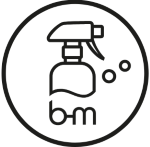
Multipurpose Cleaner with Citric Acid
What you’ll need
- Citric Acid
- 10 drops of Essential Oil (optional)
- Measuring jug and container for mixing
- Trigger Glass Spray Bottle
- Funnel
- Waterproof Label
- Distilled water or boiled water, slightly cooled
- Microfibre Cloth or Microfibre Glass Cloths
Method
- Combine 1 tbsp of Citric Acid with 250 ml of distilled or previously boiled and slightly cooled water in a container until fully dissolved.
- Pour the mixture into a Trigger Spray Bottle using a funnel, then optionally add 5-10 drops of your favourite Essential Oil (remember, if you’re using it, always add it last). Make sure to label your cleaning solution with a waterproof label.
- Shake well and spray onto surface and allow it to work for ten minutes.
- Wipe clean and dry with a Microfibre Cloth for a streak-free result.
Use for: Multiple Surfaces around the house
This Citric Acid spray is a fantastic Multipurpose Cleaner. Not only does it tackle bacteria, mould, and mildew with ease, but it’s also excellent for everyday disinfecting and cleaning tasks (Trusted Source). Its true strength shines when it comes to banishing soap scum, hard water stains, calcium deposits, lime, and rust.

Disinfect Kitchen:
Use the multipurpose solution from above to disinfect surface areas in your home. Citric acid is a powerful antimicrobial agent. Use it to sanitize surfaces in your home like kitchen counters, tables, or other areas where you eat and prepare food. Use it to sanitize wooden cutting boards and utensils. After washing, coat the surface with the citric acid solution and allow it to work for five to ten minutes. Rinse the surfaces with hot water and dry well.

Bathroom:
Spray the Citric Acid multipurpose solution from above on bathroom tile, fibreglass shower stalls, or shower doors to cut through soap scum. Let it work for at least 10-30 minutes and clean as usual.

Mould and Mildew:
Not only does this Citric Acid cleaning solution remove hard water stains with ease, it will clear up streaks, scum, mold and mildew too. Citric Acid cleaners kill the common bathroom mold, aspergillus brasillensis, in minutes. To fight mold and mildew spray the solution over the effected area, allow the solution to work for 10-20 minutes and then wipe off.

Stainless Steel:
Citric Acid is highly effective in cleaning rust, limescale, and other deposits from stainless steel fixtures, equipment and surfaces in your home. Apply the Citric Acid solution directly onto the stainless steel and allow it to work for several minutes. Then, use a microfibre window cloth to polish the surface. Rinse it with water and dry it completely. If any residue remains on the stainless steel, repeat the procedure.

Electronic Screens:
Phones, laptops, tablets, televisions, etc., all come with a protective coating to reduce smudges. Citric Acid can break down this layer, revealing the layers meant to be protected.

Sealed Wood:
Citric Acid can degrade the wax sealant, causing the protective layer to break
down and leaving a cloudy appearance. It also makes the surface more susceptible to further damage.

Natural Stone:
Citric Acid can etch or pit stone, granite, marble, and quartz surfaces so it should never be used to clean natural stone surfaces. The enzymes in Citric Acid will break down the delicate surface layer of these materials, corroding slowly over time.
Once prepared, this spray will last for approximately 4-8 weeks. For optimal shelf life, store it properly labeled in amber or dark bottles to protect it from light. If it starts to look or smell off before the 8-week mark, discard it and make a fresh batch.
Store Citric Acid and Essential Oils sealed tightly, in a cool, dry place, out of reach of children and pets.
Avoid breathing in Citric Acid as it can cause upper respiratory symptoms, always measure out the Citric Acid powder in a well-ventilated area. Whilst Citric acid is found in food items in a small quantity as a preservative if large amounts of Citric Acid are ingested it could cause nausea, vomiting, and diarrhoea.
Citric Acid And Essential Oils can irritate your eyes and skin. Take care not to spill the powder or oils and wear rubber gloves when working with these substances.
Never ingest Essential Oils, even if they are diluted. Avoid applying pure, concentrated oils directly to your skin. Use caution when using Essential Oils around young kids and pets; even small amounts can be harmful to your furry friends. Avoid using Essential Oils in cleaning recipes unless you have thoroughly researched the relative safety of the specific oil for your particular type of pet. Our Oils include safety instructions for both dogs and cats.
Lastly, if you are pregnant or have certain health conditions, Essential Oils may not be the right choice. Always check with your doctor before using Essential Oils.

B&M Pro-Tip 1:
Give your cleaning routine a major boost by picking the perfect Essential Oil for the job. For example, Peppermint Oil is a champ at delivering streak-free windows and keeping pests at bay. Lemon Oil slices through grease like a pro and leaves your wood floors and furniture gleaming. Need to tackle some mildew? Tea Tree Oil is your go-to warrior. Lavender Oil is the multitasking hero you never knew you needed – it freshens up your mattress and bed linens and is so mild that you can even disinfect toys with it. Dive into the world of essential oils and discover their amazing properties.

B&M Pro-Tip 2:
Citric Acid mixed with water can produce a solution as acidic as vinegar. Adjust the concentration based on your needs: for everyday cleaning, mix 1 tsp per 250 ml for a gentle cleaner, or increase to 2 tsp per 250 ml for a potent disinfectant and descaling solution for tougher tasks.
